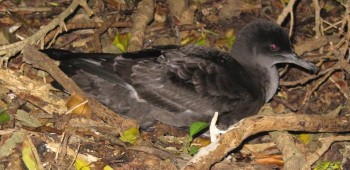
Sooty Shearwater, Photograph from West Coast Penguin Trust
Colin Miskelly (Museum of New Zealand, Te Papa Tongarewa, Wellington, New Zealand) and colleagues have published in the ornithological journal Notornis on a survey of burrowing petrels on islands in Fiordland, New Zealand.
The paper’s abstract follows:
“Forty breeding colonies of three petrel species were found on 35 of 71 islands surveyed in southern Fiordland, Fiordland National Park, New Zealand, in November and December 2017. Almost all islands in Chalky Inlet, Preservation Inlet, Cunaris Sound, Long Sound, and Isthmus Sound were surveyed. Sooty shearwater (Ardenna grisea) was the most widespread and abundant species, with an estimated 23,425 burrows on 25 islands. Broad-billed prions (Pachyptila vittata) were breeding on nine islands (9,940 burrows estimated), and mottled petrels (Pterodroma inexpectata) on five islands (1,240 burrows estimated). This is a 3-fold increase in the number of petrel colonies in Chalky and Preservation Inlets and associated waterways identified in published accounts, and the first estimate of the number of burrows on each island. Long-term survival of most of these colonies is dependent on ongoing control of stoats (Mustela erminea) on islands in these southern fjords. The persistence of remnant petrel colonies on small islands is probably due to stoats being infrequent invaders that are unable to persist when migratory petrels depart at the end of the breeding season.”
Read a popular account of the publication.
Reference:
Miskelly, C.M., Bishop, C.R., Taylor, G.A. & Tennyson, A.J.D. 2019. Breeding petrels of Chalky and Preservation Inlets, southern Fiordland – a test of the ‘refugia from resident stoats’ hypothesis. Notornis 66: 74-90.
John Cooper, ACAP Information Officer, 07 February 2020

 English
English  Français
Français  Español
Español